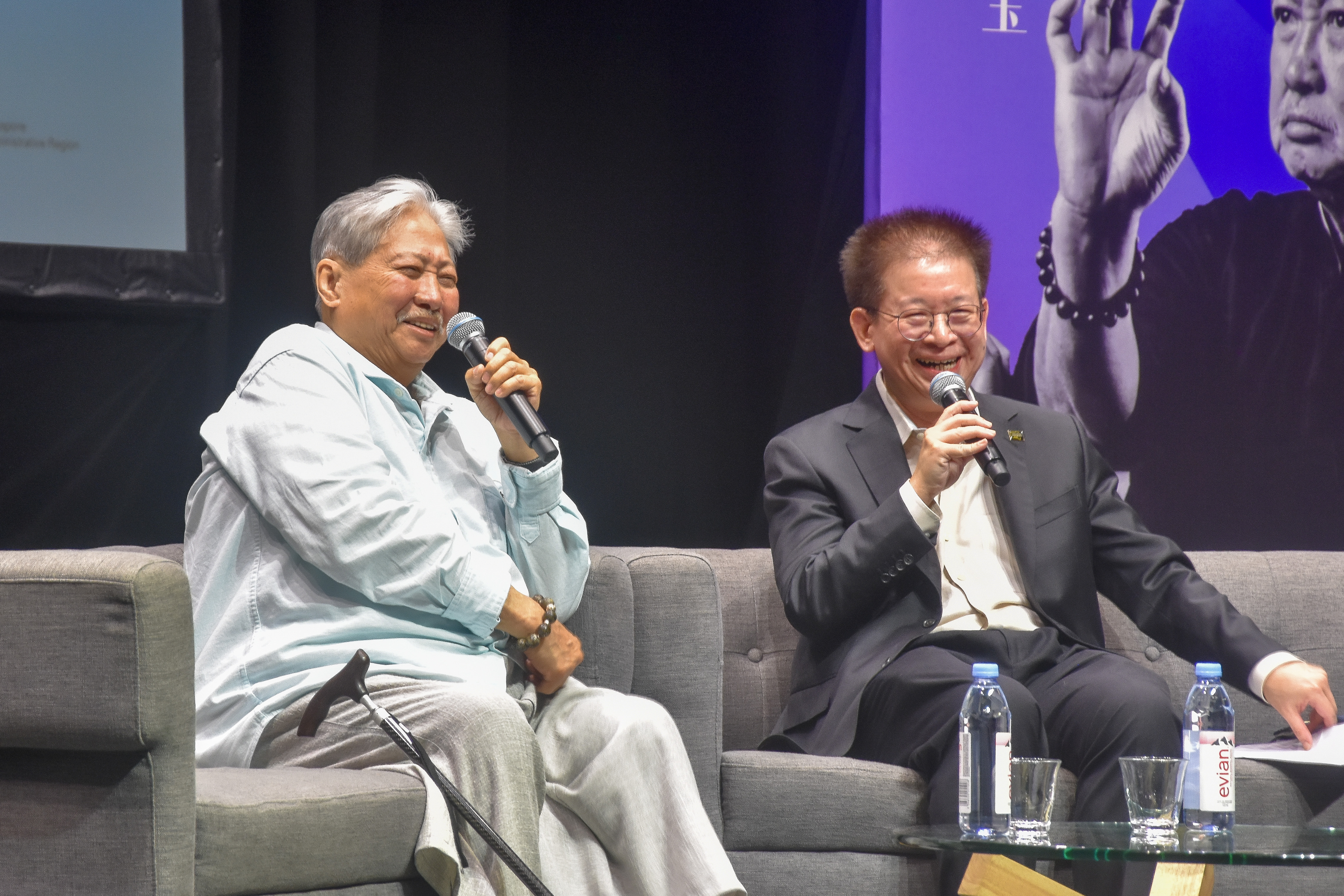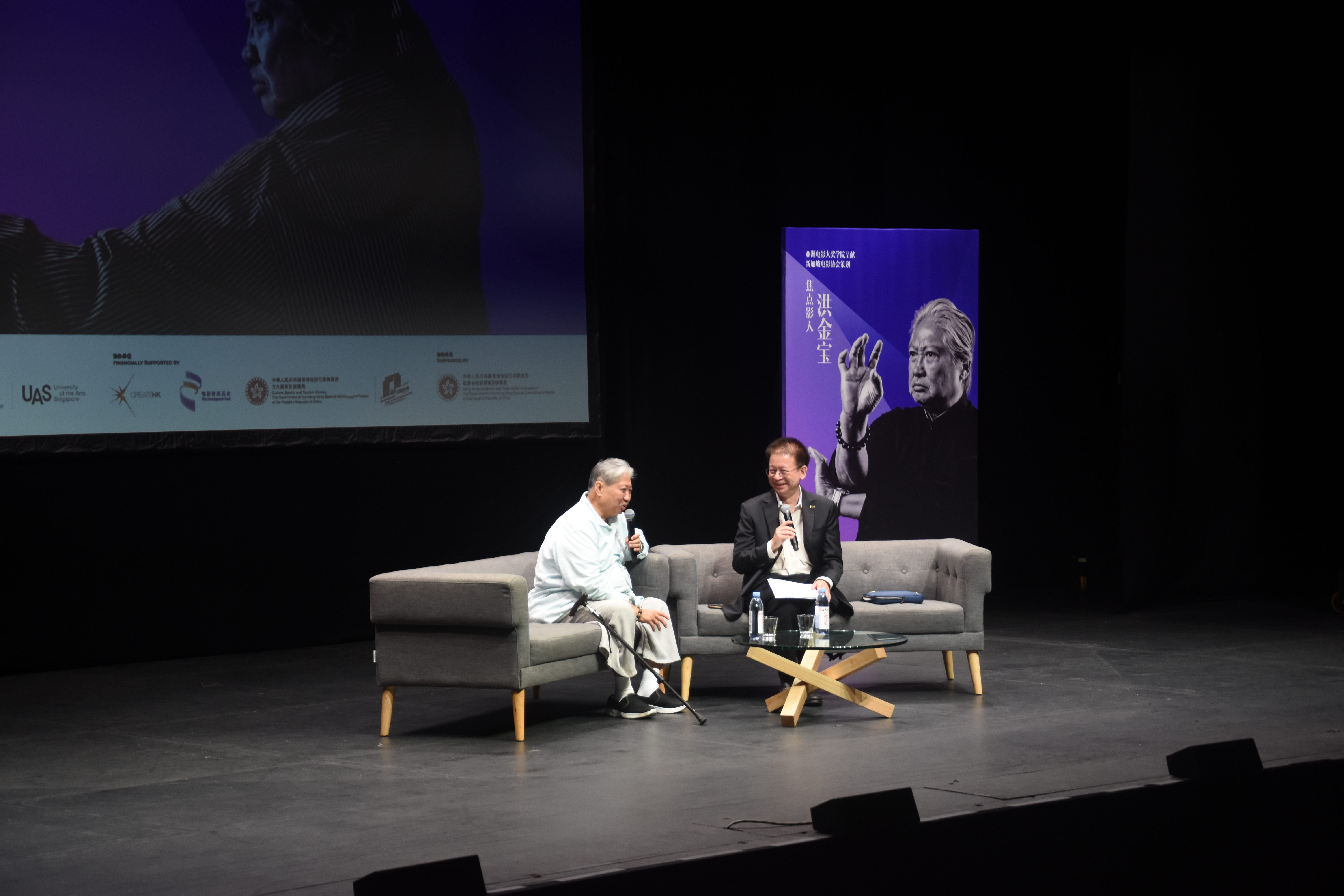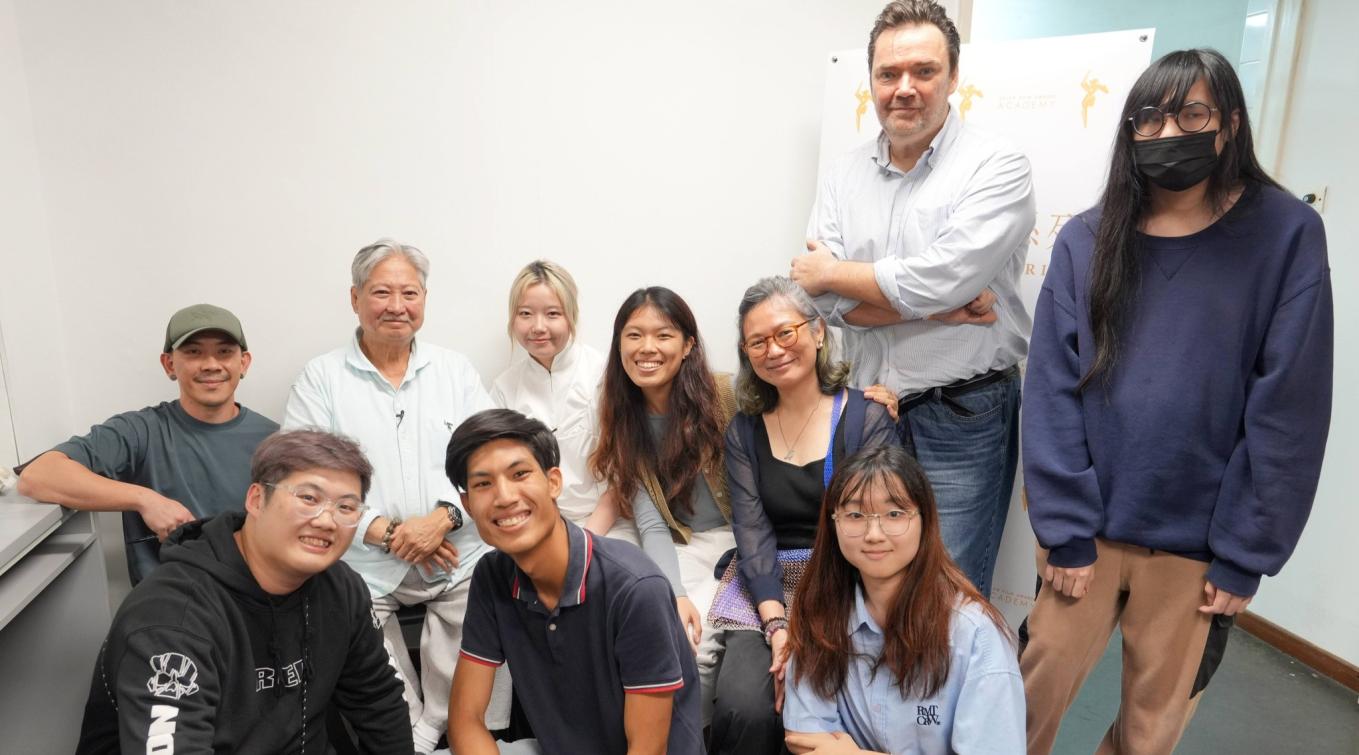Sammo Hung (back row, second from left) with Chris Shaw, Head, Puttnam School of Film & Animation (standing, second from right), Dr Gan Sheou Hui, Lecturer, Animation, BA (Hons) Animation Art and BA (Hons) Film students.
By BA (Hons) Animation Art students Grace Tan, Khoo Justen, Chen Jinyi and Kim Jinsol. Video filmed and edited by BA (Hons) Film students Arel Koh and Zachary Seak Zhen Tsing.
With the onslaught of new age technology, the question of how to honour the art of storytelling and the traditions of the silver screen is one that weighs upon a new generation of filmmakers. How might the genres of yesteryear still endure in today’s world?
In Singapore and throughout Asia, many of us grew up on martial arts or kung fu films. But from the long, uncut shots of the past to the quicker, snappier edited shots of today, are kung fu films losing their charm? How can this art form continue to reach a generation that has grown accustomed to a different pace and style of storytelling?
The Hong Kong film industry is not new to being placed in such a position—one that heralds incoming, necessary evolution. In the late 1970s the Hong Kong New Wave emerged, in which filmmakers sought to create films that were original and unconventional. One of the pioneers who spearheaded this movement is none other than the master, Samuel ‘Sammo’ Hung Kam-bo.
LASALLE had the privilege of hosting Master Hung for a masterclass organised by the Singapore Film Society. He took some time from his busy schedule to speak with us about the state of kung fu films, his experiences in the industry, and his personal philosophy.
Hello, Big Brother Hung! Thank you for sharing your wealth of experience in the masterclass. We’ve been looking forward to this interview for a while, as we want to know more about your mindset.
Okay, bring it on! (He raises his hands up in a Man Sao (問手) pose)
First off, how has Singapore treated you so far? Has the food here been to your liking?
Of course! Wherever I go in the world, the food is always to my liking. I am always dreaming about food… Even when I lie on my bed at night, I’m thinking about what to eat tomorrow!
Hahaha… Well, as we wait in eager anticipation for your new movie, Twilight of the Warriors: Walled In, to be released in Singapore, would you mind sharing with us what your greatest obstacle was in the process of making this film?
Actually my biggest challenge was just wondering when we could be done with filming and pack up to head home! There weren’t many challenges besides that.
Other than that, I do hope that after watching the whole movie, audiences will be satisfied and happy, and leave the theatre with a sense of excitement or thrill—that will be enough for me. It’s been a while since kung fu movies like these have garnered such responses and reactions. I hope that it can even inspire imagination, giving us the hope that kung fu movies can continue to be created and sustained.
Looking back on some of the kung fu movies you yourself have created over the past decade, such as The Bodyguard (2016) and your entry in the Septet: The Story of Hong Kong anthology film (2020) , these works all seem to embody a theme of looking back on a long life. Is this something that you have been dwelling on over in recent years?
Yes, I’ve been mulling over how to live my life. Besides eating, walking and sleeping, what else do you hope to do? You would hope to have something novel to stimulate you, to get your wheels turning, to stir up new thoughts about what to do next and in the future. ‘What do I hope to do?’ Now, that is the big question. Dreams are so important, but if you’re not careful, they can just as easily be nightmares, you know?

In a recent interview, you had mentioned that you were worried about the future of kung fu films. In this day and age, when people viciously and hurriedly consume all forms of entertainment, do you feel that filmmakers and audiences now have a different view of what ‘entertainment’ means as compared to the past?
Yes, there are many changes. The Hong Kong kung fu movie scene has been in a bit of a slump, so many producers and stakeholders are more wary about investing in these films. So the current times pose a difficult and more prominent challenge for kung fu filmmakers like me.
When we talk about new challenges, most people think about how films are viewed nowadays. Many people now watch most of their media on smaller screens such as smartphones and tablets. Does this affect your filmmaking philosophy?
You can look at it both ways—it could have an impact, but it could just as easily not matter. At the end of the day, watching films in theatres is bound to be the better experience. If people get tired of the big screens then movie theatres would need to change.
However, nowadays the reality is that everyone spends way more time on their small screens. So the question becomes; how do we make movies that contain elements that are attractive and meaningful to them, regardless of medium?
What other obstacles have you had to overcome as a filmmaker?
Actually, the biggest challenge nowadays is wanting to create a film but not having any willing people or money to make it with. In fact, this is not just a problem that I face alone, it’s a burden I feel the whole film industry facing.

Do you have any advice for students like us? How can young people make art and earn a livelihood while facing the many challenges posed by the current era?
Be diligent, be resilient, and be accepting. Accept the good, for sure. But even when things are bad, take them in your stride. Only after doing so, are you able to become more discerning. That is most crucial actually—being able to accept things as they are.
In this day and age, the reality that students like you face is very different from that of the past. We had many opportunities last time, but now they are scarce. There are many things that you just need to dare to venture into, to take chances, to question, to experience. What can you do when you feel sad after going through a bad experience? It is completely fine to feel down, but after you allow yourself to experience those feelings, pick yourself back up, give a smile right after and tell yourself that tomorrow can only be better.
You must hold on to hope every day. There is hope everywhere, there is hope in tomorrow. But let me tell you, tomorrow never comes! For when you wake up to it knocking on your door the next morning, it’s already today. So just remember that there is always hope, and that hope will pursue you as much as you pursue it. The most important thing for humans, at the end of the day, is the non-stop pursuit of hope.
Thank you so much for sharing your wisdom. Do you have any last thoughts for us?
To be a good person, one must be resilient and have kindness in one’s heart. You must be open-minded about things, help others whenever possible, and encourage others to offer their assistance when you are unable to help. Kindness is the most important thing.
With special thanks to Kenneth Tan of the Singapore Film Society, and the Singapore Chinese Film Festival.
Photo credits: Chew Zhen Jue, Diploma in Animation




